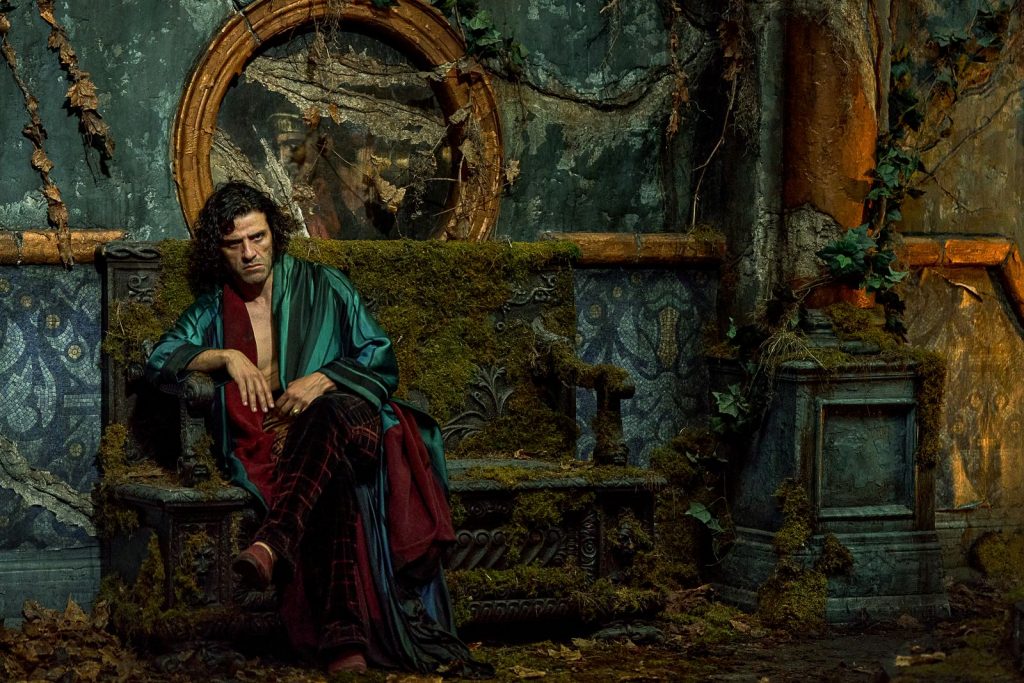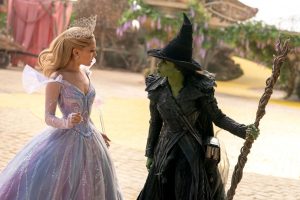Reviews include Wicked: For Good, Rental Family, and Champagne Problems.
TFCA Friday: Movie Reviews for Oct. 17
October 17, 2025

Welcome to the TFCA weekly, a round-up of reviews and coverage by members of the Toronto Film Critics Association.
In Release this Week
After the Hunt (dir. Luca Guadagnino)
“The inconsistency is the point. That’s not to say that After The Hunt doesn’t take a clear stance on these issues by its end — it does — but it deftly captures the push-and-pull (and cringe) of where these discussions have landed in the past five years, sometimes clumsily but with nuance, complexity, and self-awareness,” writes Kathleen Newman-Bremang at Refinery 29. She also chats with Ayo Edebiri and Andrew Garfield about exploring the film’s grey areas: “It’s proof in a lot of these spaces that the reason why we’re not done is because we don’t want to touch certain areas — on all sides. So being able to then go here’s this amazing, intentional, thoughtful, caring group of people and we all want to dig into this thing with each other,” says Edebiri.
“None of the main characters is what he or she appears to be, and the extent of Alma’s self-deception comes out in a brief ‘confession’ about her adolescence. It will break your heart. So, are the old ways better, with things concealed and a private life maintained? Or is the new tell-all, reality-TV-type reality a better choice? Just wondering. That has nothing to do with the movie,” says Liz Braun at Original Cin. “After the Hunt is elusive, but you won’t stop thinking about it after you see it — that’s a good thing.”
“After the Hunt won’t be the kind of hit film that has made Guadagnino’s reputation. The characters aren’t all that attractive, morally or physically. This isn’t a film of black and white choices. The main palette is grey: no one is right when everyone is wrong,” notes Marc Glassman at Classical FM. “Guadagnino has crafted a film that raises ethical issues while offering a critique of East Coast liberal institutions and philosophies. While any idea or organization should be fair game for criticism, this film has been released at a bad time to attack ‘woke’ culture, the ‘Me too’ movement and the Ivy League. Trump is doing too good a job of it along with his minions.”
“Director Luca Guadagnino and debut screenwriter Nora Garrett are as mischievous as their characters, sowing doubt in a clash of ideals and self-interest. Their skeptical lens fixes on the movement’s ambiguities, asking: In a world of shifting stories and dubious agendas, who gets believed?” asks Peter Howell at the Toronto Star. “Fortunately, there’s a top-flight cast led by Julia Roberts, whose character, Alma Imhoff, is the most ferocious intellectual since Cate Blanchett stormed concert and academic halls as the conductor in Tár. The proverbial steel hand inside a silk glove, Alma is a wonderful character for Roberts to rage with, and does she ever. She can make a whisper sound like a shout.”
“his twisty and morally complicated film grabs the zeitgeist by the throat. After the Hunt should make audiences squirm,” writes Pat Mullen at That Shelf. “Friendships could be made or broken by post-screening conversations.” Mullen also speaks with Julia Roberts and Luca Guadagnino about their twisty thriller: “Art exists for to provoke and to inspire and to mend and to hurt us,” says Roberts. “You sit in the dark with people. There’s an expectation that something is about to happen, and I think it’s so nice right now in this chaotic world that we’re living in to sit down and it gets quiet, it gets dark, and you kind of feel like, ‘Okay, this is a little bit of a therapy just to be away from the world.’”
Ballad of a Small Player (dir. Edward Berger)
“Ballad of a Small Player is the latest from director Edward Berger, who last year took the papal thriller Conclave to the Oscars with eight nominations, and whose previous film, 2022’s All Quiet on the Western Front, won four including Best International Feature,” says Chris Knight at Original Cin. “This one is less Oscar-baity, although Farrell turns in his usual stellar work — hard to believe this is the same guy who played a very different character in The Banshees of Inisherin. Berger, in his introduction to the movie’s premiere at the Toronto International Film Festival last month, called it a love letter to the star, although it feels more like hate given what his character has to go through.”
“Berger is a great stager of scenes, as can be observed in his previous films,” notes Gilbert Seah at Afro Toronto. “In this film, the glamour and spectacle of the casinos are all on display. His best filmed segment is actually the one after the closing credits role, an elaborate dance sequence between Colin Farrell and Tilda Swinton.”
“Colin Farrell is superb as a high-stakes gambler riding out a streak of luck in Macau’s neon-lit casinos in Edward Berger’s Ballad of a Small Player. Despite a few indulgent detours, the film thrives on Farrell’s magnetic performance and Berger’s stylish direction. The result is a flawed yet hypnotic character study that bets big, and mostly wins,” writes Rachel West at That Shelf. “Ballad of a Small Player offers more than just the story of a degenerate gambler. It prods the edges of a man whose biggest enemy is himself. He is a lost soul left in a frenzied state of despair and elation. However, the film is not without its weaknesses.”
Everybody Loves Me When I’m Dead (dir. Nithiwat Tharatorn)
“In the first half of the film, the interaction of the characters and the story’s premise is established to little fanfare,” says Gilbert Seah at Afro Toronto. “All goes according to what one might expect without any surprises, meaning a little slow and boring initial half of the film.”
Frankenstein (dir. Guillermo del Toro)
“Unlike in most Frankenstein sagas, here the newly awakened Creature doesn’t immediately burst from the lab and threaten terrified villagers. Del Toro provides some getting-to-know-you moments first, including a touching scene in which Victor introduces the Creature to sunlight. His reference to ‘sun’ makes it sound like he’s embracing his new ‘son,’” says Peter Howell at the Toronto Star. “As the Creature wanders forlornly, searching for Victor and some kind of release, the monster discovers a blind old man who befriends him, offering food and simple companionship…He could take solace in knowing del Toro has given us everything we could want in a Frankenstein movie, blending showmanship with soulfulness. It’s a fine time at the movies for lovers of vivid nightmares.”
“I don’t know when Frankenstein’s monster became almost permanently an incoherent, lurching killing machine. But this is a creature who deserves all the sympathy del Toro drums up for him,” says Jim Slotek at Original Cin. “The costumes and sets are terrific, and the Arctic scenes oppressively bleak. The drama is buttressed by era-appropriate formality in dialogue and delivery. Subtlety is not a strong-point of the movie, but considering the story, of a creature alternately on the run and on a rampage, this seems a moot criticism. In the end, del Toro has created an impressive piece of entertainment that manages to retain the existential thoughts that inspired Frankenstein in the first place. Ultimately, it’s one of his best films.”
“After making one of the more beautifully weird films of his career with 2021’s underappreciated Nightmare Alley – and with a brief detour into stop-motion fable-ism with 2022’s fascinating but reductive Pinocchio – Del Toro has made an epic that perhaps only he can truly appreciate,” says Barry Hertz at The Globe and Mail. “If Frankenstein is enough to shake the director of his creature comforts and push him to explore something new, then so be it. But don’t expect everyone else to devote themselves to such an exquisite corpse.” Hertz also speaks with GDT about becoming one of Toronto’s famous faces: “I’m very infantile about my relationship with Toronto. Contrary to most Canadians, I adore it! Except the traffic, I hate the traffic,” del Toro tells Hertz. “But I’m in love with how Toronto can be portrayed. I love when Denis [Villeneuve] portrayed the city in Enemy. For me, it’s an imaginary land. … Toronto is one of the most architecturally undisciplined cities in the world. A lot of people don’t understand, in order to be a movie star, you have to have a face that’s slightly misaligned. That’s not perfect. It’s not symmetric. And to me, Toronto has that quality.”
Good Fortune (dir. Aziz Ansari)
“It is all fairly silly and sometimes wildly uneven stuff, with Ansari’s rather dark socioeconomic themes often colliding uneasily with a barrage of lighthearted zingers,” writes Barry Hertz at The Globe and Mail. “But the laughs rarely let up, with Ansari committed to ensuring that barely a minute passes by without a wry observation or sharp gag. While your mileage may vary on Ansari’s line delivery − which can lean toward the incredulous − he is a wily on-screen presence, consistently energizing and sympathetic. Rogen, meanwhile, is as dryly hilarious as ever, especially once the tables are turned on Jeff.” Hertz also chats with Ansari about the film’s very Canadian cast, which also includes Sandra Oh and Keanu Reeves. “I didn’t realize Sandra was Canadian until she was on set! I did think, oh wow, that’s a lot of Canadians. But they’re very nice and funny, so they came through for me.”
“And while the performances here are winning — especially Reeves, who leverages his dim stereotype in wink-nudge meta fashion — the tone is uneven,” says Kim Hughes at Original Cin. “Funny bits seem tacked on rather than organic, and the film takes it sweet time to establish Arj’s central issues. We the people, also members of the 21st century, get it: delivering food and handyman work for a living is no living and pricey post-secondary education guarantees nothing. All that could have been established in a handful of scenes. Instead, it’s built up in the film’s first third as some kind of revelatory sad sack operetta.”
“A combination of body swapping and angel earning wings genre that avoids strong messages but results in amusing at most missed comedy,” notes Gilbert Seah at Afro Toronto.
Inside Furioza (dir. Cyprian T. Olencki)
“The film is ultra-violent, and on the positive side, the performances are convincing, the action chase sequences, particularly the opening car chase on the highway well executed. On the negative side, the film stretches too long and it is hard to follow the story unless one is aware of what is going on prior to watching the film,” says Gilbert Seah at Afro Toronto.
Kiss of the Spider Woman (dir. Bill Condon)
“Condon stages these film sequences with Technicolor pizzazz, and he intriguingly inserts both Tonatiuh and Diego Luna into this world, where their interactions — involving betrayal, lies, suppressed lust — mirror what’s happening in their real lives,” says Glenn Sumi at Go Ahead Sumi. “The problem is that the prison sequences are so drab, claustrophobic and devoid of conflict they’re a slog to get through. I wish the film’s Valentin had more to say about his political struggles and his reasons for fighting a brutal regime — a theme, by the way, that could have really resonated with the current political moment. Without that, like Molina, you long to return to the fantasy of the silver screen. At least JLo looks like she’s having fun in her slinky outfits, elaborate wigs and half a dozen outfits and musical numbers.”
“Ignoring the fact that Lord of the Rings’s orc battles or Everything Everywhere All at Once’s time travelling shenanigans aren’t exactly realistic either, the suspension of disbelief needed to accept Ben Platt suddenly launching into showtunes does seem to be too high a bar for seemingly the same group of people who say they like all music — except country,” says Jackson Weaver at CBC. “That Kiss of the Spider Woman doesn’t really try to get past this is both its greatest strength and most glaring weakness. Its strength is in its unapologetic love for musicals and classic Hollywood: a core element of this story since its original stage production and especially following the 1985 film by director Héctor Babenco.”
“This new one makes for a solid retelling, thanks in no small part to its talented cast. Diego Luna stars as Valentin, a political dissident and revolutionary who has been imprisoned by Argentina’s corrupt military government in 1983. His new cellmate is Luis Molina, whose crime is public indecency (i.e., he’s gay). Molina is a chatterbox who decorates his bunk with a beaded curtain and his side of the cell with movie posters. They include one for Kiss of the Spider Woman, yet another adaptation, this one fictional and starring screen siren Ingrid Luna, played by Jennifer Lopez,” writes Chris Knight at Original Cin. “Kiss of the Spider Woman remains an engrossing tale in this new century, and a lovely paean to old movies and the thrills of getting lost in them.”
“The dances are magnificently choreographed, with Jennifer Lopez doing justice to the Latino dances,” says Gilbert Seah at Afro Toronto. “The choreography is no Bob Fosse masterpieces as in his Cabaret with Ebb and Kander, but the dances are still fantastic. Director Condon directs the dances in one take, which enhances the magnificence as opposed to the dances in Baz Luhrmann’s Strictly Ballroom, Moulin Rouge, or his Elvis films, in which the choreography is broken up into too many cuts, with edits appearing less than every 12 seconds, thus chopping up all the dances.”
“The film feels dated through no fault of its own,” writes Marc Glassman at Classical FM. “We’re now used to LGBTQ+ plots. There is no frisson in the idea that Valentin and Luis will fall in love. The Dirty War and other violations of democracy in South America seems like ancient history to modern audiences who are more concerned about contemporary conflicts in other areas of the world. So does an evocation of Fifties musicals, which still held an attraction to audiences in the Sixties and Seventies (as did film noir). Sadly, history and popular culture have moved past Kiss of the Spider Woman. Bill Condon’s film is certainly worth seeing but it’s doubtful that it will resonate in the ways that earlier versions of the tale, as literature, film drama and a Broadway musical, did in the past.”
“This is a turn that reminds fans of the distinction between ‘actors’ and ‘stars’,” says Pat Mullen at That Shelf. “J-Lo gives a showstopper of a performance playing three characters in director Bill Condon’s reimagining of the Kander and Ebb musical, itself based on Manuel Puig’s novel. She sings, she dances, and she brings layers of intoxicating power as silver screen siren Ingrid Luna. It’s a tricky role, too, since Kiss of the Spider Woman hinges on Ingrid’s ability to seduce a viewer and for audiences to relate to Molina’s palpable identification with the star.”
If I Had Legs I’d Kick You (dir. Mary Bronstein)
“It would be unfair to call Byrne as Linda a revelation,” notes Barry Hertz at The Globe and Mail. “The Australian actress has been charming and bewitching audiences for decades, albeit mostly through mainstream comedy fare, becoming one of the few non-bro members of the Judd Apatow crew: Bridesmaids, Get Him to the Greek, the two Neighbors films and Apple TV’s vastly underrated Platonic. Yet as powerful a comic force as Byrne can be, she’s never had as tremendous a moment as the one Bronstein is giving her here: an opportunity to turn deeply dark character drama into something hilariously ghastly, or perhaps ghastly hilarious.” Hertz also chats with Byrne about director Mary Bronstein’s casting coup: “It’s hard to speak of one’s own profile, outside of my day-to-day life. But again, she cast Conan and [A$AP] Rocky and I feel like I’m in the same category: a perhaps unexpected choice, one that could have gone many different ways,” says Byrne.
Other (dir. David Moreau)
“The main flaw of the film is the upended conclusion in which the audience is left to interpret what is actually going on,” says Gilbert Seah at Toronto Franco. “The end is more frustrating than innovative. Other than that, Moreau’s film is well shot, well performed, and displays promise.”
The Perfect Neighbor (dir. Geeta Gandbhir)
“The film offers a firsthand experience feel as the film features through police bodycam footage, 911 calls, and on-scene transcripts — with minimal narration or interview framing — allowing the events to unfold through the raw materials of the case. Through its subject, the effective reconstructed true crime drama raises broader questions about race, power, fear, and how certain legal frameworks may enable violence,” says Gilbert Seah at Afro Toronto.
The Time that Remains (dir. Adolfo Alix Jr.)
“The film is, unfortunately, marred by over-stretched melodrama (a key complaint in Filipino movies) with a soundtrack and a lengthy deathbed scene,” says Gilbert Seah at Afro Toronto. “Running at 2 hours, the film could’ve been shortened for more bite and effectiveness; still a worthy piece of storytelling and melodrama for the undemanding moviegoer.
The Twits (dir. Phil Johnston)
“The Americanization of the story, despite the insects at the beginning of the film speaking with a British accent, does not really work, nor the blend of the theme of cruelty and empathy,” says Gilbert Seah at Afro Toronto. “The film ends up a minor Roald Dahl work. It is also not that funny!”
The Weedhacker Massacre (dir. Jody Stelzig)
“The film begins with a sudden kill in which one brother kills the other over some marijuana,” says Gilbert Seah at Afro Toronto. “The killing does not make much sense, but neither does the entire film. Aimed at least to be a silly comedy, that it is, though the film turns out to be amusing at best. – a low-budget derivative horror comedy with a few satirical edges.”
Wisdom of Happiness (dir. Philip Delaquis, Barbara Miller)
“He begins with breathing,” notes Anne Brodie at What She Said. “Breathe in, hold, blow – it changes your brain, brings calm. Being kind, compassionate and warm-hearted (like his beloved mother), doing good for others, listening and connecting. He constantly hugs, touches and connects with his followers, embracing and holding the face of an extremely old woman while she beams. His ways of being happy are already known to us, and I was expecting more exotic, esoteric philosophy, but he’s right we are all the same and we all respond to ‘warmheartedness’ and love. The time is right given the stressors of the world which he acknowledges but does not name. Highly recommended.”
File Under Miscellaneous
At The Globe and Mail, Johanna Schneller remembers Diane Keaton: “Ms. Keaton’s work meant a lot to me, too. Her women were sexy, restless, itchy, charming. They spoke their minds. They made mistakes. She never played a scene the way anyone else would, and she was always right. Images of her will play in my mind forever: the way her face collapses instead of lighting up when she finally sees Mr. Beatty on the train platform in Reds. The way she smokes a joint in the tub in Shoot the Moon. The way she turns arguing into foreplay in Love and Death. The madcap scene where she dumps her tiny daughter at the coat check in Baby Boom. Her cackling with Frances McDormand and Amanda Peet in Something’s Gotta Give. The way her mesmerizing, almond-shaped eyes would suddenly go soft with love.”
At What She Said, Anne Brodie previews the Female Eye Film Festival: “The female perspective is key to its 70 documentary, feature, experimental, animation and short films from around the world.”
At The Globe and Mail, Barry Hertz considers how the Canadian government is forgetting to bolster Canadian arts and culture at a moment when it urges Canucks to feel a swell of national pride. “The longer we ignore the tenuous state of homegrown culture – from funding to distribution to consumption – the more we risk losing any real sense of what this battle for the soul of Canada is even about. Who are we without the stories that we watch and listen to and read together?” asks Hertz. “For generations, Canadian audiences have been overwhelmed by the strength and resources of the U.S. entertainment industrial complex. Today, we have a prime opportunity to subvert the twinned forces of audience uninterest and government ignorance that have stymied our artistic capital. Are we a culture that shapes itself based on the stories that we tell one another, or by the items in our grocery cart? Even better: Why can’t it be both?”
TV Talk/Series Stuff
At What She Said, Anne Brodie considers Chat GPT and Suspicious Minds: “These experts claim that Brooks and others in the doc are experiencing the same kind of weird romance with tech are experiencing ChatGPT Delusion Syndrome, a pattern preventing them from living normal, social, ordered- human- lives. Sean King O’Grady’s shocking series examines the sad new reality.”
At Original Cin, Liam Lacey calls the return of Loot “a lightly witty, feel-good watch. But there is something missing in this third season. Apart from an episode which takes place in England, which links old money pomp and past colonial abuses, the politics feels backgrounded. The series feels more like a make-it-up-as-we-go-along television sitcom than a multi-part narrative with any serious points to make.” He also looks at the doc series Mr. Scorsese: “Though Miller doesn’t make much of it, in a late scene in the final episode, we see Scorsese, in mid-conversation, quickly reach for his inhaler that he keeps at arm’s reach, and we’re reminded of a man who has spent most of his entire life having to remember to catch his breath.”



